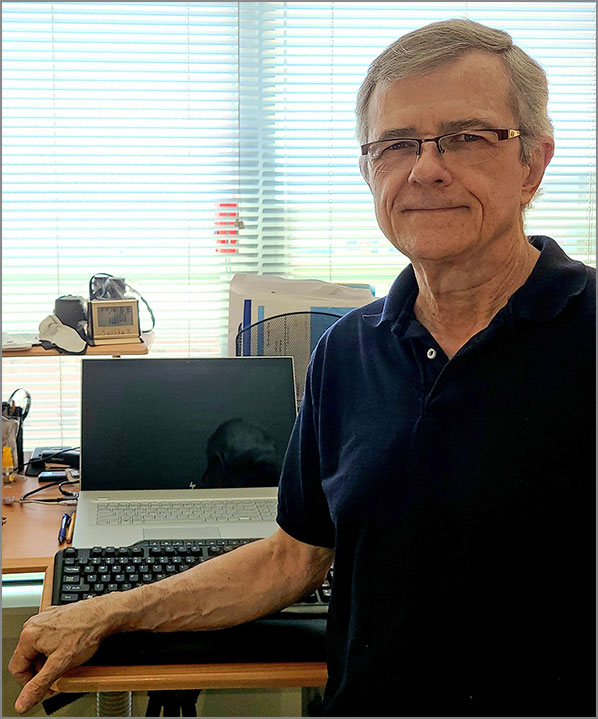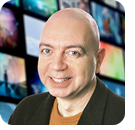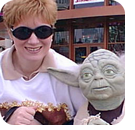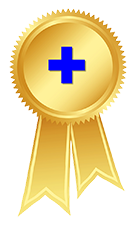In this issue PROFILES: Meet Fred, the empowerer Additional articles in the PLUS issue LANGALIST: Reader feedback on driver/software updaters, and more! PUBLIC DEFENDER: Revolutionary battery tech changes the way we charge ON SECURITY: Gold copies — keep them close HARDWARE DIY: Opal: I’m building a new PC
PROFILES Meet Fred, the empowerer
By Chris Husted If a single organization were approaching five decades of experience in educating people about computers and helping them to solve problems they were having with their PCs, it would be called an institution. Fred Langa, who writes for AskWoody, is just that. Fred’s distinguished career has seen him scale the heights of computer publishing, winning some two dozen awards along the way. But bragging about that is just not his style. For Fred there has been one common theme throughout his years of tech writing and publishing: focusing on what people need to know to help them make their own lives better. How did you get into writing about computers and technology?
I grew up with Sputnik and the American launches, and it hit me with science and tech. That was one major part of it. When I got a little older, I had an ability and a penchant to write, and when I got a little bit older, we got into the Vietnam War and the Nixon years. That was when I became more socially aware, and when PCs came about the idea arose of combining advanced powerful technology to empower people. It was the personal part of PCs that really attracted me to them — the idea at the time that you could buy a device that would level the playing field with corporations and governments, which at the time were the only ones who could afford it. So I thought this would level the playing field with interesting tech. So that came together with a penchant for writing, and I started writing. Of all the magazines you have he worked with, which are your favorites?
Top of the list is Byte. It was a fabulous crew. It was a great magazine. It was well respected. I learned a lot about publishing there, probably as much about publishing as computers. Byte was dying on the newsstands, so I became editor in chief with the task of trying to reinvent it and make it compete against the newer magazines that were doing better — and that taught me an awful lot. I came away learning how not to manage. I was a novice manager. I wish I could go back and do some of my personnel management again, But the magazine did well, and while I was there, Byte published its biggest-ever issue. It was the size of a phone book. That little bit of notoriety caused a headhunter to come looking for me to relaunch Windows Magazine, and that is my second one. It was a little magazine on the West Coast. They had four to five staff members. The place that headhunted me, CMP Publications, wanted to buy a little magazine and launch it as their first general-circulation magazine. CMP was a trade publisher; they had nothing on the newsstand and nothing by paid subscription. They wanted to take me from Byte and do something with this new thing called Windows. This was the end of DOS and the beginning of the Windows era. And that was a great job because I basically got to build it from scratch. I was not inheriting much of anything. We didn’t take over their operation. We kept some of the staff and just built a new operation in New York to launch Windows Magazine. That was during the Windows operating system hey day, from 1991 to 1997. Windows 3.1, Windows 95, Windows 98 — all those major hits. You may recall that with Windows 95 and Windows 98, people slept on the sidewalks outside Best Buy to go in and be the first to buy this stuff. It was like what iPhones are now. So that was a hell of a ride, and I thoroughly enjoyed that. With Windows Magazine, was the goal to bring the focus back to the user?
Absolutely. Yes, it was always aimed to help the end user manage and master these new technologies — demystifying them and empowering people so they could make the most of this. So that they were not passive consumers of what was shown to them on a screen, but active participants, actively in control of their hardware and their data. Why keep the focus on just Windows, and not the other systems that have come along?
I was at Byte when the Mac first came out. That was the first system to put an easy-to-use interface on a commercial operating system. But it was very expensive. It was a boutique thing, and it was a little frou-frou, which didn’t appeal to me. But then Bill Gates came along and said, let’s put the power of the graphical interface on inexpensive, affordable commodity hardware. Those were the two components that came together. It’s not just an easy way to use computers, but a cheap and affordable way to use computers. And you put those two things together, and that’s what made Windows the success it was through the ’90s. That was why I focused on Windows rather than the Mac. It had a wider audience, which means more people, and that also means that there were more people who could use help, who needed assistance — and more people having trouble understanding things. As Windows evolved very quickly in those days, it also had a lot of problems, so there was a lot to write about. And why am I still doing it today? Because there’s still a lot to write about. Why focus on one particular user’s problem? Do you still think individual fixes are the top priority for people to know?
I base most of my columns on reader mail, questions people have sent in. What I try to do from the week’s pile of questions is to pick one that does lead into a wider discussion. So it’s not just one person’s question, it’s an entree to a problem that can assist more than just the one person. That’s still going on now. You asked about the future, and that’s a very good question, because it is very clear that Microsoft does not consider Windows as central as it used to be. They eliminated the whole Windows division, about two years ago. All the Windows stuff was absorbed into other parts of Microsoft. So if you’re eliminating the whole Windows division, that’s a good clue that maybe Windows isn’t as important to Microsoft — and I think that’s pretty clear. The quality of Microsoft’s documentation just sucks now. There is contradictory information from Microsoft online. The stuff is scattered. It’s not as good as it was. So I think we are in the final years of Windows as it winds down. Windows 11 might be the entree into what comes next. Microsoft has already tried a unified operating system that would run on phones, laptops, and PCs. Maybe we’ll come back to something like that again — I don’t know. But at least for right now, we are still getting a lot of email from people who are struggling, in part because the Microsoft documentation is so terrible these days. So as long there is a need out there, we might as well serve it. Do you have one golden nugget of advice for everyone?
It used to be “read the manual,” back when manuals actually contained useful information. That is much harder now, as you cannot even find the information you need. It’s scattered everywhere. And we are moving into a “turn it off, turn it back on again” kind of world, which is a little weird. It makes us those passive users again and not active masters of own little technical domain. I think there is a single thing that comes up more often: people have to let go of their old hardware and their old way of doing things. You need to start over from time to time. That could be just reinstalling the operating system or buying a new PC. There is a lot of mail from people trying to nurse old equipment. These are folks who remember the days when you could buy a PC and it would be okay three years later. You buy a PC now, and three years from now it’s going to be obsolete and slow, and so on. I think people simplifying their set-ups and modernizing, just staying current, are the two big things. If you have decent, reasonably current hardware and a reasonably current fresh install of Windows, chances are it’s going to work. You get screwed up when you say, I need to use my dot-matrix printer that has worked fine since 1994, and there haven’t been drivers for it in 10 years … but what can you do? You gotta give it up. You say you’re entering “geezerhood.” How much writing do you still do?
I am writing one column a week. At the height of it, my peak output was when I was doing the LangaList. It was a one-person operation. That was published twice a week, and that was 2,000 to 3,000 words per issue, so there was about a decade of sustained high output. Now that I have gotten considerably older, I am down to one a week, which keeps my hand in but isn’t as burdensome. What else occupies your time today, and how important are these activities to you?
They are increasingly important, and the principal activity is volunteer work. I do work at the food bank, where I load food trucks by hand. That takes the better part of two days a week, especially during the pandemic. Food insecurity is a horrible thing that shouldn’t exist in the modern world and certainly shouldn’t exist in the United States today. This is a small thing I can do — help people to get fed — and that seems a pretty good thing to do. And I am involved in the Red Cross, and that’s more irregular. Between that and columns, I actually have a reasonably full schedule, but not as full as I want it to be. Can we expect more columns to continue?
For the foreseeable future, yes. There’s no firm end date, taking it as it comes. Will the focus continue on people’s problems?
In part, it depends on what happens in the tech world, what happens with Windows. And what readers and end users are facing, whatever that is, is probably where I’ll go.
Chris Husted, who once upon a time was a junior computer column writer, is currently Executive Editor at The Phuket News. He has spent 20 years working in news in Phuket, with a one-year hiatus as a staff editor for a small national newspaper on Borneo.
You’re welcome to share! Do you know someone who would benefit from the information in this newsletter? Feel free to forward it to them. And encourage them to subscribe via our online signup form — it’s completely free!
Publisher: AskWoody Tech LLC (sb@askwoody.com); editor: Will Fastie (editor@askwoody.com). Trademarks: Microsoft and Windows are registered trademarks of Microsoft Corporation. AskWoody, Windows Secrets Newsletter, WindowsSecrets.com, WinFind, Windows Gizmos, Security Baseline, Perimeter Scan, Wacky Web Week, the Windows Secrets Logo Design (W, S or road, and Star), and the slogan Everything Microsoft Forgot to Mention all are trademarks and service marks of AskWoody Tech LLC. All other marks are the trademarks or service marks of their respective owners. Your subscription:
Copyright © 2021 AskWoody Tech LLC, All rights reserved. |
||||||||||||||||||||||||













